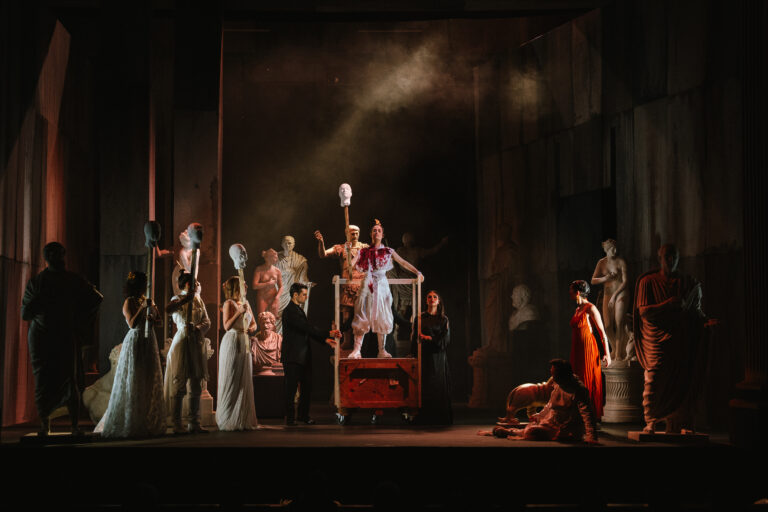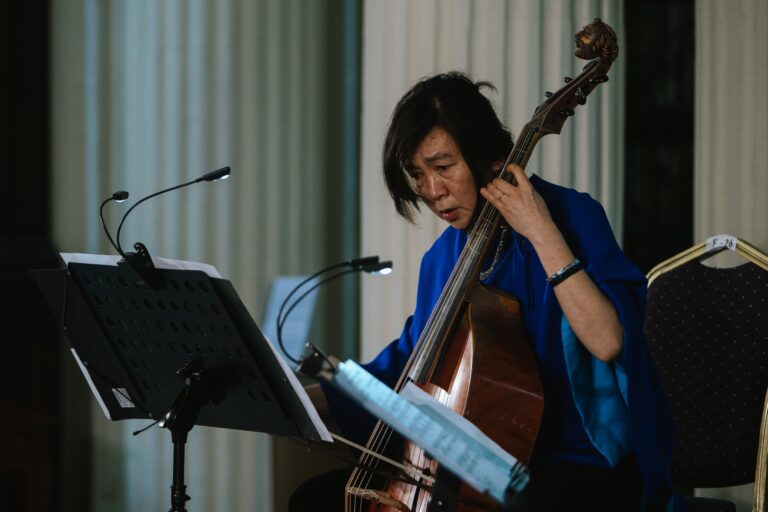Did I go into the show with very little prior knowledge? Yes. I didn’t know what the title meant and didn’t Google it beforehand. I was drawn in by a video the production had posted – which you can find here. That led me to Spazju Kreattiv’s website and I was intrigued —A sociopolitical show? Yes, please.
Blanket Ban (noun): a rule, law, or restriction that applies universally, without exception.
Written and performed by Davinia Hamilton and Marta Vella, this verbatim piece explores Malta’s restrictive abortion laws. Developed through in-depth research and interviews, it brings real-life stories to the stage, giving a voice to the voiceless, encouraging audiences to reflect on the country’s reality. Directed by Sam Edmunds and Vikesh Godhwani, with dramaturgy by Stephanie Dale, the production is brought to life by Chalk Line Theatre. Isabella Van Braeckel’s set design, Tom Fitch’s video design, and Denise Perini’s stage management contribute to the powerful storytelling at its core.
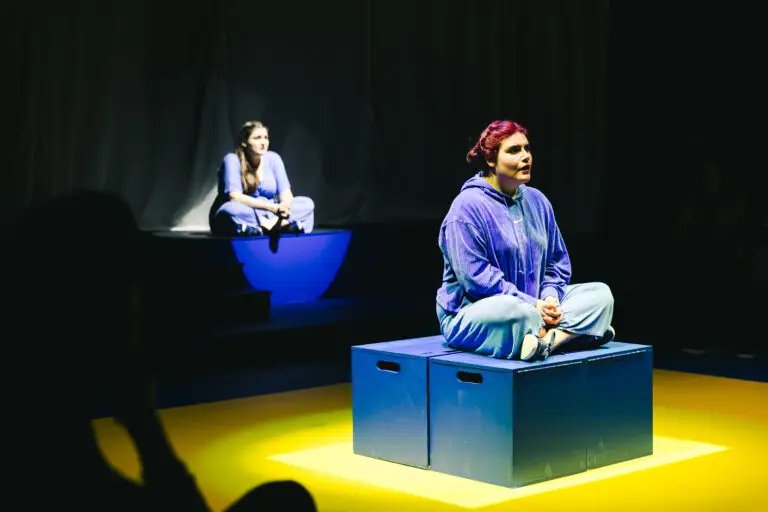
The show didn’t feel like a traditional play. Instead, it came across as a stripped-down presentation—raw, unpolished, and intentionally makeshift, capturing the urgency of the conversation. Performed in the round, the intimate setting of Spazju Kreattiv’s theatre made the experience feel even more immersive. The use of both the central space and a backdrop stage kept the action dynamic and engaging. What stood out the most, I think, were the curtains used for projections. Why curtains? They felt symbolic—perhaps representing the secrecy around abortion. The tension between what’s hidden and what’s revealed.
Audience interaction was key. At times, we weren’t just watching—we were part of the conversation, complicit in the unfolding narrative, much like in real life. The show blurred the line between performer and audience, drawing us in completely. And I say “performer” loosely, because this wasn’t about acting—it was about the real people behind the stories. Marta and Davinia weren’t just playing roles; they were fully in it, putting themselves on the line. In the Q&A, they spoke about their “duty of care to the audience,” and that, I feel, made all the difference.
The only other work I’d seen from Vikesh Godhwani was Mid-Djarju Ta’ Student Fi Skola Tal-Knisja by Jamie Cardona, so I was curious to see his distinct directing style at play. It was immediately evident here. Given the controversial topic, comedic relief made sense—but the opening, a Malta Sajf ad, set to Ħadd Għalik’s intro music, caught me off guard. I thought to myself, What am I watching? Are they really making a joke out of this? But as the show unfolded, I realized I was in for a treat.
The theme of Malta—what it is and what it has been through—ran throughout the piece. At first, I questioned its relevance, but it became clear it was necessary. Not all audience members were locals, and what is obvious to us locals may not be to others. More than that, Malta’s history reminds us that nothing came easy—“Nothing came out of not being angry.” The metaphor of the sea as both a cradle and a force beyond control was striking and a final projection—two women overtaken by the waves—hit hard. The audience burst into applause, only to realize it was the end of the show.
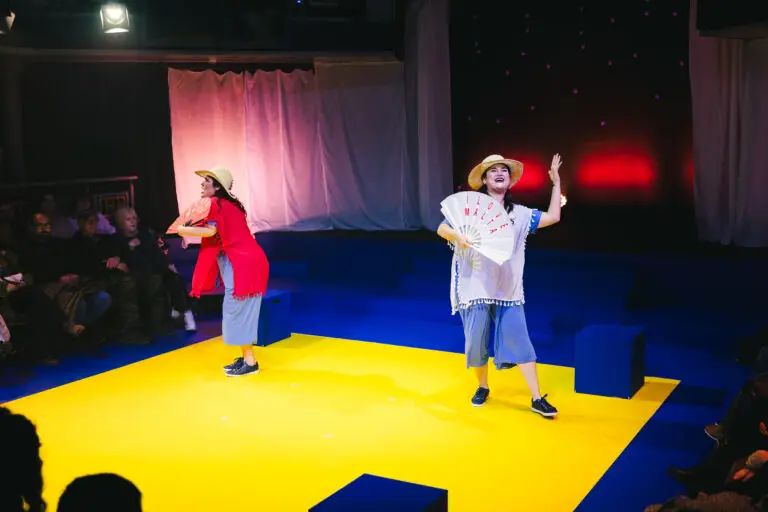
The use of media footage was particularly powerful in grounding the show in the real-world context of its subject matter. Quoting politicians, playing recorded statements, and showing Zoom interviews from the research all brought an added layer of authenticity. These real voices, often caught in moments of political tension or personal reflection, blurred the lines between the performance and the actual world outside the theatre. It made the conversation feel less abstract, creating a sense of urgency by presenting firsthand accounts and opinions that viewers could easily recognize. The stage was not just a fictional space but a direct response to the media landscape we navigate daily.
In a Sex-Education segment, which referenced The Silent Scream, a film I hadn’t heard of before but ended up watching afterwards, the portrayal of the teacher and student dressed as clowns made me wonder—was this meant to suggest that Sex-Ed in Malta is a joke? It certainly felt that way. My own experience with Sex-Ed in school was comprehensive, but I can’t speak for what it was like before or now. The stigma around simply wanting to be informed I feel—especially coming from a religious background—adds yet another layer of guilt and silence. This scene then spiraled into a chaotic reading of real online comments: “Should’ve kept your legs closed.” , “Ja qaħba!” and unprofessional advice from users. It was messy, intense, and a disturbingly accurate representation of the internet—where you get sucked into the madness, whether you want to or not.
May’s storyline was one of the most moving parts of the show, among the many personal experiences brought to life. Davinia stepped into May’s shoes, performing alongside May’s recorded voice, allowing us to follow her journey from start to finish. It hit harder because we didn’t just hear about her relationships with those involved—we saw it all unfold. From her upbringing to the moment she discovered she was pregnant, to finding support and then breaking down in her friend’s arms when she was handed £2,000 for the procedure and travel. It was raw, intimate, and deeply affecting.
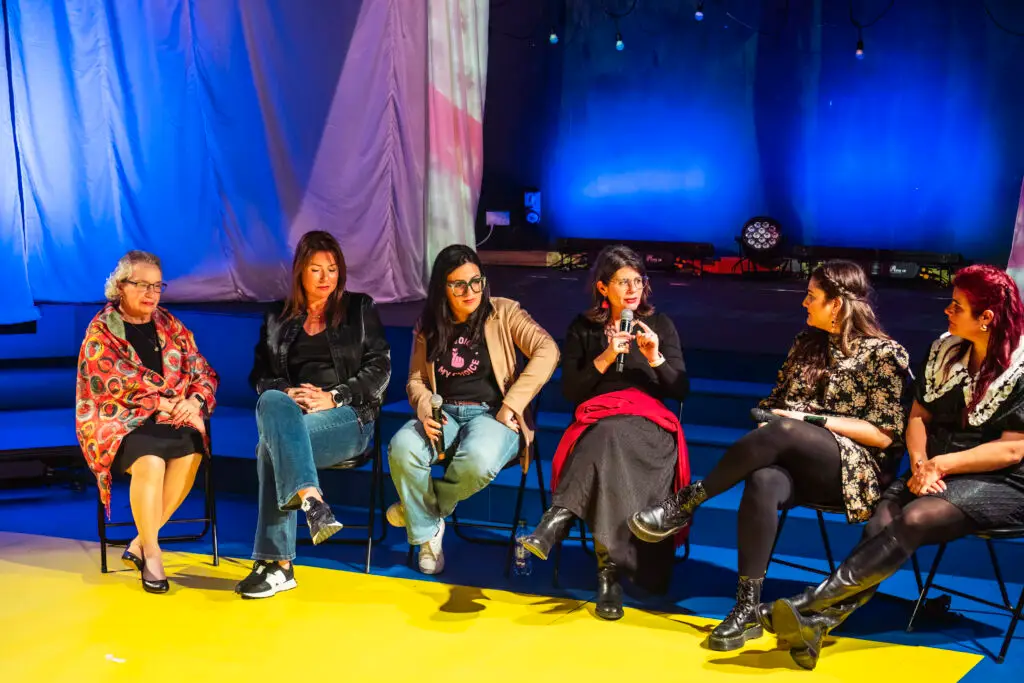
The Q&A revealed that this show had been in the making for five years, first debuting at the Fringe Festival. Edmunds pointed out that the audience’s response had shifted though—what was a warning about ignored rights in Edinburgh, had become a call to action in Malta. The show has evolved over time, and I can’t help but wonder: if they continue performing it, how many more times will it change? Will new voices be added? Will it stand as a testament to how far we’ve come on this journey?
It’s a show I’d bring my mother and sister to. A show I’d invite Mary, my neighbor, to witness. A safe space—sparking conversation without turning into a battle. And that, in itself, is profound. Delicate, yet undeniably impactful. Do I want more? Yes. Don’t we all? This piece will linger in people’s minds, challenging the status quo. The fight is far from over. “I’ll never forgive Malta for making me feel like I couldn’t turn to the ones who loved me the most.”



